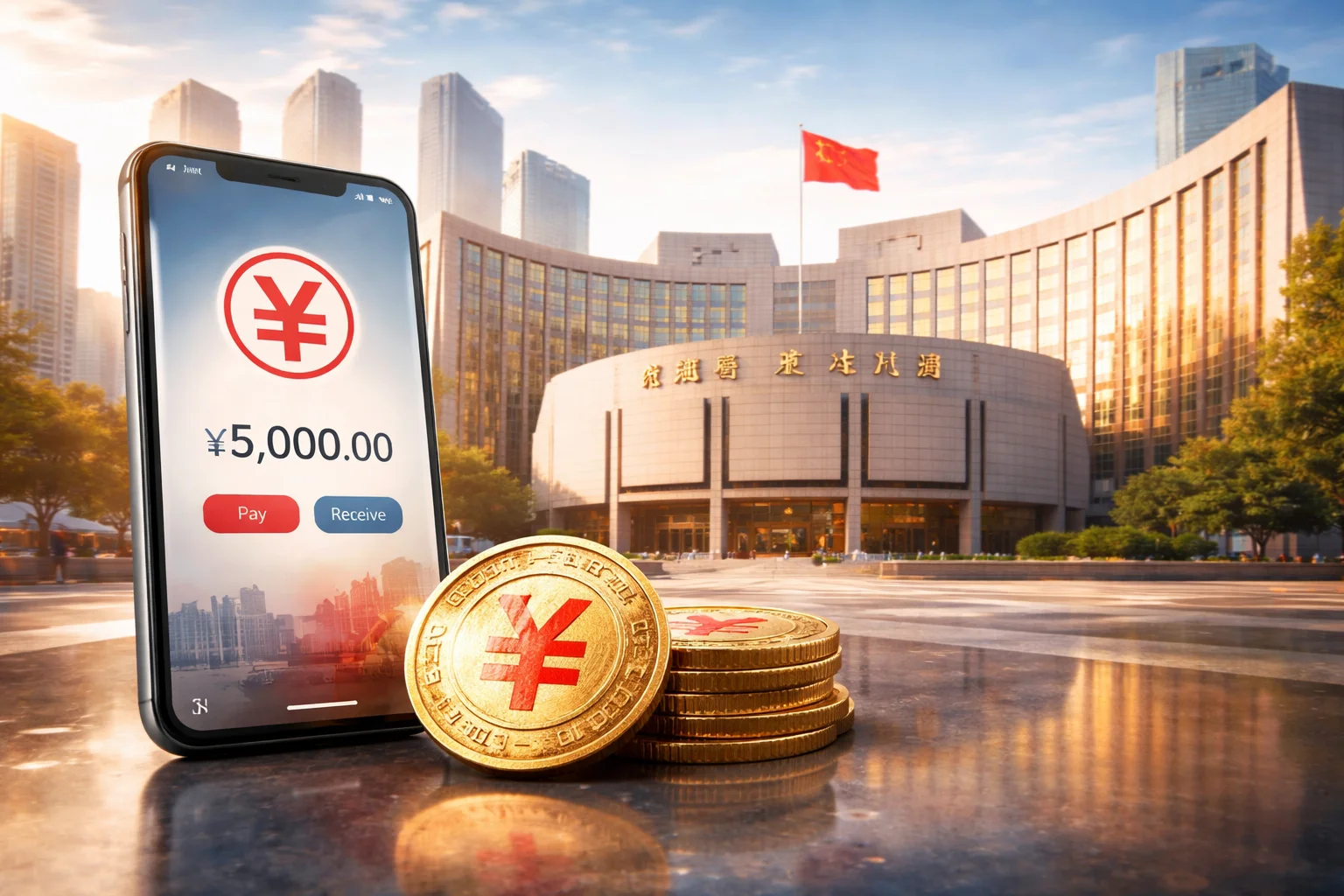Blockchain
This page lists the latest Blockchain news and market analysis. Browse articles, expert insights, and updates in this category on JrKripto. Stay informed with in-depth coverage of cryptocurrency trends and developments.
News
Blockchain News
Blockchain News
Browse all Blockchain related articles and news. The latest news, analysis, and insights on Blockchain.
Two Crypto Platforms Shut Down This Week
While the crypto market continues its volatile course, two major platforms decided to cease operations this week. ZeroLend, which provides lending services in the decentralized finance space, and Parsec, an on-chain analytics company, announced that they are shutting down due to increasing costs, decreasing liquidity, and changing market dynamics. These recent developments have also strengthened expectations that the consolidation process in the sector may accelerate.ZeroLend closes after three yearsZeroLend announced that it will cease operations after three years of activity. In a message shared on Discord, the project's co-founder and CEO, Ryker, stated that the current business model is not sustainable. The team announced that a "orderly and transparent liquidation process" will be carried out and that users should withdraw their funds from the platform. Positioned as a multi-chain lending protocol that does not offer custody services, ZeroLend offered products in areas such as Layer 2 solutions, liquid restakeable tokens, real-world assets, and BTCFi. The project, which completed a $3 million seed funding round in 2024 at a valuation of $25 million; Consensys had received support from investors such as Polygon Ventures and Morningstar Ventures. However, increasing operational difficulties, decreasing on-chain activity, and security risks led the project to a dead end. Ryker stated that liquidity had dropped significantly on some supported networks, some oracle providers had terminated their services, making revenue generation difficult. The team noted that lending protocols were already operating with low margins, and that the increasing risk of attacks and fraud attempts had worsened the situation.Following the news of the closure, the platform's native token, ZERO, experienced a sharp decline in value. The token fell by 45 percent in the last 24 hours, while the monthly loss reached 91 percent and the annual loss exceeded 99 percent. ZeroLend joined the ranks of DeFi startups such as Alpaca Finance, which closed after announcing losses, and Polynomial, which chose to end the project rather than issue a token.Parsec bids farewell after five yearsParsec, which operated in the field of on-chain analytics, also announced that it has ceased operations after five years. The company announced its closure via X, stating, "Parsec is closing." CEO Will Sheehan stated that the market had shifted direction and that they had not been able to adapt sufficiently to this change. Founded in early 2021, Parsec was known for its DeFi and NFT-focused data streams. However, the failure of leverage demand in the spot DeFi lending market to return to previous levels after the FTX crash, and the decline in NFT volumes, weakened its business model. In 2025, NFT sales volume fell to approximately $5.63 billion, while average sales prices also decreased compared to the previous year.Parsec, which received investments from major players such as Uniswap, Polychain Capital, and Galaxy Digital, grew rapidly during the bull run when Bitcoin rose from $36,000 to $60,000. However, with the shift in the sector, the company struggled to maintain product-market fit. Industry representatives argue that the fragmented liquidity structure is at the root of the closures. The distribution of liquidity among different exchanges, custodians, and blockchains; This makes price stability and a sustainable revenue model more difficult. The need for a more integrated and reliable infrastructure for institutional participation is emphasized. On the other hand, the generally weak market outlook also exacerbates the situation. As the Bitcoin price has declined in recent months, the increase in search trends for phrases like "Is Bitcoin heading for zero?" reflects the deterioration in investor psychology.

Societe Generale Selected XRP Ledger For Its EUR Stablecoin
Societe Generale-FORGE (SG-FORGE), the digital asset subsidiary of French banking giant Societe Generale, announced the launch of its euro-backed stablecoin, EUR Coinvertible, on the XRP Ledger (XRPL). The announcement, made on February 18th, marks a new phase in the company's multi-chain strategy. SG-FORGE stated that EUR Coinvertible is now active on XRPL, emphasizing that the integration process was supported by Ripple's custody infrastructure. This provides the technical foundation for secure storage and institutional-standard use of the stablecoin. New step in multi-chain strategyEUR Coinvertible was previously launched on the Ethereum and Solana networks. The XRPL integration strengthens SG-FORGE's strategy of having a presence on different blockchains. With this move, the company aims to both increase adoption and benefit from XRPL's scalability, speed, and low transaction costs. XRP Ledger has long stood out as a preferred layer-1 blockchain for financial institutions in cross-border payment solutions and tokenization projects.SG-FORGE CEO Jean-Marc Stenger, in his assessment following the launch, stated that the successful launch of XRPL reinforces the company's commitment to offering next-generation, regulated crypto assets. Stenger said they will continue to expand the scope of digital asset solutions in line with the principles of transparency, security, and scalability.Ripple infrastructure and new use casesOne of the notable aspects of the integration was the custody solution provided by Ripple. Cassie Craddock, Ripple's General Manager for the UK and Europe, stated that SG-FORGE is one of the leading institutions in the institutional crypto asset space in Europe. She noted that Ripple has long provided SG-FORGE with digital asset infrastructure and offers technology that meets the highest security and operational standards. According to the statements, EUR Coinvertible is not only being considered as a payment instrument, but also for integrated use in Ripple products and as trading collateral. This indicates that the stablecoin could play a more active role in derivative transactions and institutional trading platforms.A wave of regulation-compliant stablecoins in EuropeEUR Coinvertible is positioned as a stablecoin pegged one-to-one to the euro and designed for institutional use. SG-FORGE emphasizes that the product has been developed in compliance with regulations and is structured to meet the needs of institutional investors in particular.With the clarification of the regulatory framework for digital assets in Europe, banking-based stablecoin projects have become more visible. The shift of traditional financial institutions towards blockchain-based assets is accelerating the institutionalization process of the market.XRPL integration expands the reach of EUR Coinvertible while also creating liquidity and use case diversity among different blockchain ecosystems. SG-FORGE's move indicates that European-based banks are preparing to take a more active role in stablecoin competition. In the coming period, EUR Coinvertible is expected to see increased use in various financial products, including collateral, payment instruments, and tokenization projects. The multi-chain approach provides flexibility for institutional players and could increase the weight of blockchain-based solutions in the European financial system.

UK Takes a Step Towards Blockchain-Based Bonds: HSBC Selected
His Majesty’s Treasury has taken a significant step towards its goal of moving government bonds to a blockchain infrastructure. The Treasury has selected HSBC’s tokenization platform, Orion, as the official provider for a pilot program called the Digital Gilt Instrument (DIGIT). With this move, the UK is on track to become the first G7 country to issue tokenized sovereign bonds on the blockchain. The DIGIT pilot aims to test how distributed ledger technology (DLT) can be used in UK government debt processes. Through this process, the Treasury aims to both develop DLT infrastructure in local financial markets and expand the tokenization ecosystem. What is HSBC’s role?In a statement, HSBC emphasized that issuing digital government and corporate bonds on the blockchain could provide structural improvements in debt capital markets. In particular, it was noted that transaction settlement times could be significantly shortened. Settlement processes, which can take days in traditional bond markets, can be completed much faster thanks to on-chain settlement. As part of the DIGIT pilot, a short-term and “digitally native” government bond will be issued. This instrument will operate within the Digital Securities Sandbox and will function independently of the government’s main debt management program. Thus, the pilot will allow for the testing of an innovative model, detaching itself from the existing system. UK Economy Secretary Lucy Rigby said the project aligns with the goal of attracting investment and making the country a more attractive place to do business. Rigby stated that DIGIT will concretely demonstrate how the UK can benefit from this technology. The government believes that financial innovation will increase competitiveness in global capital markets. HSBC shared that its Orion platform has already facilitated over $3.5 billion in tokenized bond issuances across various jurisdictions. The platform has been used in digital bond projects in various financial centers, including Hong Kong and Luxembourg. This experience provides a technical and operational foundation for the UK’s pilot program. Patrick George, Head of Global Markets and Securities Services at HSBC, stated that the UK is one of the bank's main markets. George expressed his satisfaction with contributing to the development of the bond market and, more broadly, the growth of the country's economy.The pilot project strengthens not only the technology but also the legal infrastructure. Global law firm Ashurst has been appointed to provide legal advice in the DIGIT process. The firm's expertise in digital assets will play a critical role in terms of regulatory compliance and contractual structures.This step by the UK is seen as part of the global trend towards the tokenization of government debt instruments. In recent years, central banks, investment banks, and governments have been conducting pilot studies to issue bonds, money market funds, and other securities on the blockchain. The aim is to reduce costs, increase transparency, and strengthen secondary market liquidity.The DIGIT pilot is more than just a technical trial; it is part of the country's capital market strategy. If successful, it could pave the way for broader digitalization steps in the UK bond market. This could redefine London's position as a global financial center through a new generation of financial infrastructure.

Ripple Prime Chooses Hyperliquid: Integration Completed
Ripple, a global player in digital asset management, has made a significant breakthrough through its Ripple Prime service platform for institutional investors. The company has achieved its first direct integration in the decentralized finance (DeFi) space with the Hyperliquid platform. This step is seen as a tangible reflection of Ripple Prime's vision to bring together both traditional financial markets and on-chain DeFi products under a single infrastructure. According to a Ripple Prime spokesperson, the Hyperliquid integration provides users with access to on-chain derivatives markets. This allows clients to manage their positions on Hyperliquid alongside other asset classes they trade through Ripple Prime. These assets include cryptocurrency exchanges as well as traditional instruments such as currencies and fixed-income securities. Systemically, Ripple Prime remains the counterparty for its clients. Users transact through Ripple Prime, not directly with Hyperliquid or another exchange. This structure allows for the management of positions in different markets within a single risk and collateral framework. This eliminates the need for users to perform separate collateral or risk calculations for each platform. Processes are becoming simpler and more secure.The path to Institutional DeFiRipple Prime's move coincides with a period when interest in DeFi at the institutional level is rapidly increasing. In a statement, the company's international CEO, Michael Higgins, said, "As Ripple Prime, we continue to lead the way in combining decentralized finance with traditional prime broker services. This strategic expansion will offer our clients broader access to liquidity, higher efficiency, and innovation."Ripple Prime was rebranded following the $1.25 billion acquisition of Hidden Road, completed in October 2025. Hidden Road was known as an unbanked prime broker operating in multiple asset classes. Following the acquisition, the rebranded Ripple Prime currently serves more than 300 institutional clients and, according to Ripple's website, handles over $3 trillion in transaction volume annually.It is stated that Ripple Prime's transaction volume has tripled since the announcement in 2025. The platform offers services including exchange, prime brokerage, and financing operations. Ripple's native digital asset, XRP, along with its stablecoin RLUSD, plays an active role in the solutions offered on this infrastructure.In recent years, Ripple has attracted attention not only for its activities in the field of payment solutions but also for the blockchain-based technologies it integrates into the corporate finance ecosystem. The company aims to revolutionize cross-border payments in terms of speed, cost, and transparency, acting as a bridge currency for banks and financial institutions through the XRP Ledger. In addition, it focuses on developing stable digital asset solutions with its stablecoin called RLUSD.XRP is currently trading around $1.56.

WisdomTree Has Shifted Its Tokenization Focus Towards Solana
US-based asset management company WisdomTree announced another significant step in its tokenization strategy by migrating all its tokenized fund products based on real-world assets (RWA) to the Solana network. According to the company, this expansion is one of WisdomTree's most comprehensive non-EVM chain integrations to date.WisdomTree has previously integrated with networks such as Arbitrum and AvalancheWisdomTree has offered its tokenized funds primarily on Ethereum, as well as EVM-compatible networks such as Arbitrum, Avalanche, Base, and Optimism, and a non-EVM chain like Stellar. The Solana integration marks a new phase in the company's multichain distribution strategy. With this step, both individual and institutional investors will be able to directly access WisdomTree's tokenized funds focused on money markets, equities, fixed-income securities, alternative investments, and asset allocation on Solana. With this integration, WisdomTree Connect, the company's platform for institutional investors, will support functions such as direct token issuance, fund position management, and custody on Solana. Institutional clients will also be able to interact with native applications and protocols within the Solana ecosystem, subject to applicable risk controls. This structure paves the way for more integrated use of tokenized traditional finance products with decentralized applications. Through the WisdomTree Prime platform, which caters to individual investors, users can purchase tokenized funds without going through traditional banking channels by adding USDC or using conversion services with PayPal's stablecoin PYUSD. Investments can be held in Solana-based self-custody wallets, allowing users to maintain direct control over their assets. Maredith Hannon, Head of Digital Assets Business Development at WisdomTree, stated that the Solana integration reflects the company's focus on regulated real-world assets. According to Hannon, Solana's high transaction speed and low-cost infrastructure make it easier to meet the demands of crypto-familiar investors while also ensuring the regulatory standards expected by institutional investors are maintained.The on-chain tokenization of real-world assets has recently gained increasing interest among traditional asset managers. This approach has the potential to shorten exchange and settlement times, expand investment access, and create new distribution channels for regulated financial products. WisdomTree is among the companies actively involved in this field. According to RWA.xyz data, the company manages over $772 million in tokenized assets within its multi-chain distributions.The Solana ecosystem is also rapidly growing in the tokenization space. According to RWA.xyz data, the total value of real-world assets held on-chain on Solana has exceeded $1.3 billion. This makes the network one of the most popular platforms for tokenized funds and similar financial products. WisdomTree's expansion onto Solana is seen as a development that could further accelerate this growth.

US Stocks Approaching 24/7 Trading: NYSE Takes a Step Towards Tokenization
The New York Stock Exchange (NYSE) has announced it is working on a new platform that will allow trading of tokenized versions of US stocks and exchange-traded funds (ETFs), as well as blockchain-based trading. Subject to regulatory approvals, this initiative has the potential to make traditional capital markets open 24/7, similar to cryptocurrency markets. From the official press release. What does the new structure at the NYSE mean?According to the New York Stock Exchange, the developed platform will offer features such as 24/7 trading, fractional share purchases, dollar-based order entry, and instant trading with tokenized capital. The system is also designed to support stablecoin-based funding, allowing investors to open and close positions without being tied to traditional banking hours.The new structure combines the NYSE's existing Pillar matching engine with a blockchain-based post-transaction settlement infrastructure. The platform is planned to support multiple blockchains in trading and custody processes. The NYSE states that this infrastructure will form the basis of a new exchange platform focused on digital securities. If approved, this new structure will encompass both tokenized assets that are convertible one-to-one with traditional stocks and securities issued directly digitally.Investors holding tokenized shares will have the same rights as traditional shareholders in terms of dividends and governance rights. Access will be provided through qualified brokerage firms and on a non-discriminatory basis.This move follows the lead of Intercontinental Exchange (ICE), the parent company of the NYSE. ICE aims to create a market structure suitable for tokenized capital and asset transfers while preparing its trading infrastructure to operate 24/7. The company is also working closely with banks in this regard.ICE announced that it is working with major banks such as BNY and Citi to enable the use of tokenized deposits within trading institutions. This structure will allow market participants to manage their funds outside of traditional banking hours and meet collateral requirements more flexibly across different time zones and jurisdictions. NYSE Group President Lynn Martin stated that they have been a pioneer in transforming market structures for over two centuries, and that they aim to combine trust and advanced technology with fully on-chain solutions. ICE Vice President of Strategic Initiatives Michael Blaugrund emphasized that tokenized securities are opening the door to a new financial era where trading, escrow, custody, and capital creation all take place on-chain. This move by the NYSE is a continuation of its earlier efforts to extend trading hours. Indeed, a survey of market participants in April 2024 revealed that structures similar to the "always-on" model in crypto markets are gaining increasing interest in the traditional financial world.

Galaxy Announces $75 Million in Tokenized Loans on Avalanche
Galaxy Digital has taken a new step targeting institutional investors in the blockchain-based finance space. The company announced the first closing of a $75 million tokenized collateralized loan obligation (CLO) transaction structured on the Avalanche network. The transaction is backed by a $50 million principal investment provided by the institutional lending protocol Grove. Grove stands out as a structure operating within the Sky ecosystem. The CLO structure runs on-chain on AvalancheAccording to Galaxy Digital's statement, this tokenized CLO finances a credit line created for personal loan products over-collateralized with crypto assets, offered by Arch Lending, which the company supports. These loans are primarily collateralized with highly liquid digital assets such as Bitcoin and Ether. Galaxy states that approximately $75 million in loans have been financed so far, and the structure can scale up to $200 million over time. Looking at the financial structure of the transaction, a coupon rate of SOFR + 570 basis points has been set for the senior tranche of the CLO. The initial maturity date was announced as December 2026. Galaxy management emphasizes that this structure combines traditional credit markets with on-chain financial infrastructure. Speaking on behalf of the team led by Galaxy President and Investment Director Mike Novogratz, Chris Ferraro stated that they have combined their expertise in debt capital markets, blockchain technology, and asset management in a single transaction. According to Ferraro, this structure offers institutional investors a new credit market experience that is more transparent, more efficient, and conducted on-chain. The debt tranches under the CLO were issued and tokenized by INX on the Avalanche network. The tokens are planned to be traded on the ATS platform, wholly owned by Republic. This will allow qualified investors to gain access to the secondary market in a regulated environment. Anchorage Digital Bank is responsible for the custody and administration of the transaction. The bank's Atlas Settlement Network infrastructure manages the real-time monitoring of collateral and on-chain reconciliation processes. Galaxy also announced that it has collaborated with the data validation platform Accountable to create a transparent dashboard that continuously monitors credit performance and collateral status. This CLO transaction is seen as part of Galaxy Digital’s recently accelerated operational diversification strategy. Following the Bitcoin block reward halving in 2024, the company began focusing more on high-performance computing and artificial intelligence infrastructure. In October 2025, Galaxy completed a $460 million strategic investment agreement with CoreWeave to transform its Helios campus in Texas into an AI data center hub. Meanwhile, according to Bloomberg, Galaxy is also evaluating potential collaborations with Polymarket and Kalshi, which operate in the prediction markets space. The company has experimented with providing liquidity on a limited scale on these platforms and is considering broader market-making activities.

Visa Opens Doors to Stablecoins with New Collaboration
Visa is preparing to expand the role of digital assets in daily financial transactions by integrating stablecoin-based payments into its global payment network. The company announced that, as part of a strategic partnership with BVNK, it will enable funding and payment transactions with stablecoins through the Visa Direct network. Initially rolled out in select markets, this integration marks a significant transformation in Visa's network, which handles approximately $1.7 trillion in real-time money transfers annually. Visa Direct's stablecoin integrationVisa Direct already provides infrastructure enabling companies to make quick payments to individuals in areas such as payroll, gig economy earnings, and cross-border transfers. With this new step, businesses will be able to pre-fund their payments with stablecoins instead of traditional fiat currency balances. This will allow recipients to receive their payments directly into their digital wallets, almost instantly. Bank hours, correspondent banks, or settlement processes that can take days will be largely eliminated. Mark Nelsen, Visa's global product manager, emphasized that stablecoins hold significant potential for global payments. According to Nelsen, these assets offer a powerful tool for reducing friction and expanding access to faster, more efficient payment options. Their 24/7 operational structure provides a significant advantage for transfers hampered by the time constraints of traditional financial systems. BVNK will provide the technical infrastructure for this integration. The UK-based fintech company already manages over $30 billion in stablecoin payment volume annually. Visa made its first investment in BVNK through its venture capital arm in May 2025. Five months later, Citigroup's strategic investment in the company is a significant signal of increasing corporate confidence in stablecoin infrastructure. Under the new system, businesses will be able to finance their payments with stable-value digital assets such as USDC. This approach aims to reduce problems such as currency conversions, delays, and additional costs, especially in cross-border transactions. For gig economy workers, content creators, and companies with international teams, receiving fast and predictable payments is becoming increasingly critical, and stablecoin-based solutions directly address this need. Visa and BVNK plan to launch the service primarily in markets with high demand for digital asset payments. The expansion process will be shaped by customer demand and usage rates. The companies state that their long-term goal is to build a bridge between traditional payment networks and blockchain-based liquidity. This approach aims to make the existing financial system more flexible and accessible, rather than completely replacing it. Visa's move shows that stablecoins are no longer a niche crypto product but are beginning to become a permanent part of the global payment infrastructure. In this era where the lines between traditional finance and on-chain solutions are increasingly blurred, steps taken by giants like Visa have the potential to shape the direction of the sector.

PwC's Return to Crypto: US Regulations Opened the Door.
PricewaterhouseCoopers (PwC), one of the world's largest auditing and consulting networks, has decided to expand its activities in the crypto space as the regulatory environment for crypto assets in the US becomes clearer. In an interview with the Financial Times, the company's US CEO, Paul Griggs, stated that the steps taken in stablecoin regulations and leadership changes within regulatory bodies were the key factors behind this decision.PwC is shifting towards the crypto space.According to Griggs, the GENIUS Act, passed by Congress and providing a federal framework for payment-oriented stablecoins, was decisive in PwC's stronger focus on crypto. Signed into law by President Donald Trump in July 2025, the law paved the way for banks to issue their own tokens while significantly reducing legal uncertainties for institutional actors. Griggs emphasized that this process has transformed stablecoins from being merely a tool used by crypto traders into a part of the payment infrastructure. PwC's CEO highlighted developments in the tokenization field, as well as stablecoin regulations. Stating that the idea of representing real-world assets on the blockchain is progressing rapidly, Griggs said that PwC cannot remain outside this ecosystem. The company's approach is not limited to theoretical consulting; PwC already offers crypto-focused services in many areas such as accounting, auditing, cybersecurity, wallet management, and regulatory consulting.The easing of regulatory stances in the US has also expanded PwC's client base. The company serves a wide range of clients, from crypto exchanges to traditional financial institutions looking to enter this field, and even governments, central banks, and regulatory authorities. Griggs stated that in the last 10-12 months, they have strengthened their human resources and re-employed experienced individuals in the field, driven by the increasing demand in the digital asset sector.PwC's deeper involvement in crypto is also supported by concrete steps on the auditing side. The appointment of PwC as auditor for fiscal year 2025 by publicly traded Bitcoin miner MARA Holdings stands out as a significant example of regulated crypto companies turning to large auditing firms. Institutional clients need strong audit infrastructures, particularly in areas such as reserve verification, governance structures, and transparency. PwC is not alone in this move. All four major auditing firms known as the "Big Four" are now active in the crypto space. Deloitte offers blockchain strategy and consulting, while Ernst & Young is expanding its crypto tax and strategy services. KPMG, meanwhile, is targeting aggressive growth in crypto audits, compliance, and risk management. It's also worth noting that Deloitte has audited Coinbase since 2020. Looking at the overall picture, regulatory clarity in the US is rapidly closing the gap between Wall Street and the crypto world. The regulation of stablecoins and the proliferation of tokenization projects are leading traditional finance to view crypto infrastructures as a more useful tool.

The Rise in Silver Prices Has Spilled Into Blockchains
The sharp price movements in the silver market in recent weeks have not been limited to futures and exchange-traded funds. Increased volatility has also shifted investor interest to tokenized assets. On-chain data shows a remarkable acceleration in demand for digital representations of silver. This situation closely concerns commodity markets and blockchain-based financial products.1,200% Increase in Tokenized Silver AssetsAccording to RWA.xyz data, the monthly transfer volume of the tokenized iShares Silver Trust (SLV) product has increased by over 1,200% in the last 30 days. During the same period, the number of investors increased by approximately 300%, while the net asset value grew by nearly 40%. Below, you can see the change in the price of SLV since the beginning of the year, an increase of nearly 170%: The tokenization model allows physical assets such as silver to be represented on the blockchain through digital tokens. Thus, assets can be divided into smaller pieces, transferred at any time of day, and access to liquidity is facilitated. As in the case of tokenized SLV, investors outside the US can also be exposed to silver price movements without directly accessing traditional markets thanks to these structures.However, financial demand is not the only factor behind the rise in silver. Supply tightness in physical markets is becoming increasingly visible. The fact that silver premiums in Asian markets are exceeding COMEX futures prices by double digits indicates physical strength. Spot prices exceeding futures prices is also a significant signal pointing to short-term supply pressure.Analysts emphasize that there are several key reasons for this tightness. China's introduction of licensing requirements for refined silver exports as of January 1st is creating uncertainty on the global supply side. In addition, increased margin requirements in futures and year-end position adjustments are making trading in traditional markets more difficult. On the demand side, the solar energy sector plays a decisive role. The amount of silver used in photovoltaic panel production has not shown a significant decrease, even though prices have increased several times compared to 2024 levels. This chart becomes even more interesting when considered alongside the outlook for cryptocurrency markets. Bitcoin's pullback from its recent peak has caused concern for some investors, while gold and silver's rise to new records has created a sense of divergence in the markets. However, historical cycles suggest this divergence may be more a matter of timing than weakness. In the past, particularly after 2020, it was observed that gold and silver, as stores of value, moved first, while risky assets gained momentum after this upward trend stalled. A similar pattern is evident today. While precious metals maintain their strong performance, Bitcoin is moving horizontally in a wider range. It is known that in liquidity-focused cycles, capital does not flow into every asset simultaneously, but generally shifts gradually.

Starting January 1st: China Takes Critical Step Towards Digital Yuan
China is preparing for one of the most critical steps yet in its digital yuan project. The country's central bank announced that a new framework allowing commercial banks to pay interest on digital yuan balances will come into effect on January 1, 2026. With this change, e-CNY will cease to be merely "digital cash" and will effectively become "digital deposit money." The announcement was made public through an article by Lu Lei, Vice President of the People's Bank of China, published in the state newspaper Financial News. According to Lu, this regulation is a natural result of pilot studies that have been ongoing for about a decade and a testing process that has accelerated in the last five years. Although China is considered one of the world's leading countries in terms of technical capacity and scale of implementation in the CBDC field, adoption rates have not yet reached the expected level.Under the new framework, interest can be paid on balances held in verified digital yuan wallets in accordance with existing deposit pricing agreements. Furthermore, digital yuan balances will have the same protection as traditional bank deposits under China's deposit insurance system. This significantly strengthens the status of e-CNY within the banking system.The regulation also provides banks with greater flexibility in terms of balance sheet and liquidity management. Digital yuan balances can be actively used in banks' asset and liability management. For non-bank payment institutions, digital yuan reserves will be treated the same as existing customer reserves and a 100% reserve requirement will apply.Digital yuan usage is quite widespreadAccording to official data, the use of digital yuan in China has reached significant volumes. As of the end of November 2025, a total of 3.48 billion transactions were carried out, with a cumulative transaction volume of 16.7 trillion yuan. While these figures show that the e-CNY infrastructure is widely operational, they also indicate that its adoption rate in daily life remains limited. One of the main reasons for this is the long-standing dominance of mobile payment platforms in China. WeChat Pay and Alipay have largely determined user habits. The digital yuan is struggling to compete with this established ecosystem. Furthermore, concerns about centralized monitoring and anxieties associated with the social credit system are leading some to approach e-CNY with caution. Therefore, it appears that the use of paper money has not completely disappeared. On the other hand, the Beijing administration is also taking steps to expand the international use of the digital yuan. The central bank is planning pilot studies with Singapore to increase the use of e-CNY in cross-border payments. In addition, CBDC-based payment systems are on the agenda with markets such as Thailand, Hong Kong, the United Arab Emirates, and Saudi Arabia. The e-CNY International Operations Center established in Shanghai is also seen as an important part of this global expansion. Despite all these developments, China maintains its strict stance on cryptocurrencies. Cryptocurrency trading and mining activities have been banned in the country since 2021. While the Chinese government adopts blockchain technology as a strategic infrastructure, it prioritizes the digital yuan model, which is entirely controlled by the central bank.

China's Blockchain Move: Financial Regulator Releases Plan
Chinese financial authorities have implemented a comprehensive roadmap aimed at accelerating digital transformation in the banking and insurance sectors. The “Implementation Plan for High-Quality Development of Digital Finance in the Banking and Insurance Sectors,” published by the State Financial Supervision and Administration Commission of China, focuses particularly on the widespread adoption of blockchain-based financial infrastructures and the more effective use of crypto-compliant digital solutions within corporate finance."Standardization of blockchain" is keyOne of the plan's key objectives is the standardization of blockchain use in supply chain finance. Chinese regulators aim to make access to finance more transparent and traceable for companies at both the upper and lower links of the production chain through the combined use of big data and blockchain technologies. Specifically, to accelerate the digital transformation processes of companies operating in advanced manufacturing sectors, credit support mechanisms are planned to be strengthened with blockchain-based systems. This approach aims to reduce problems such as fraudulent invoices, duplicate collateral, and data discrepancies.The digital finance plan positions blockchain not merely as a record-keeping technology, but as a fundamental component of financial trust infrastructure. The document encourages banks and insurance companies to monitor supply chain data, contracts, and payment flows in real-time through blockchain-based platforms. This structure aims to reduce information asymmetry, a long-standing problem for SMEs in accessing finance. A noteworthy point for cryptocurrency markets is that China, despite maintaining a restrictive stance on direct cryptocurrency trading, is placing blockchain and distributed ledger technologies at the heart of its financial system. The plan clearly indicates that the underlying technology, rather than the cryptocurrencies themselves, will be heavily utilized in corporate finance and public oversight. This suggests the potential for widespread adoption of "permissioned blockchain" models globally. Furthermore, the regulation highlights the role of blockchain in data security and risk management. Financial institutions are expected to increase automation in credit allocation, collateral management, and insurance processes through smart contracts and distributed ledger systems. This aims to reduce operational risks and make audit processes more transparent. The plan also emphasizes that blockchain-based systems will be used under strict supervision in terms of cybersecurity and data integrity. Another critical element in the document is the combined use of next-generation technologies. Blockchain is considered in an integrated manner with artificial intelligence, big data, and even satellite-based data systems. This integration aims to enable faster and more accurate financial risk analysis and the early detection of suspicious transactions. In particular, the combined evaluation of on-chain and off-chain data is seen as a factor that can significantly increase financial oversight capacity.

Coinbase Launches Stock Trading with USDC
Coinbase has launched a comprehensive transformation in the financial services sector, moving beyond its identity as a crypto exchange. The company announced the official rollout of in-app stock trading for eligible users in the US. Thanks to this new feature, users can buy US stocks and select ETFs directly through the Coinbase app using USDC. This step stands out as one of the most concrete moves towards Coinbase's long-held vision of being "a single platform to buy and sell everything."Stock purchases with USDC are now possible on CoinbaseAccording to information shared by Coinbase, stock transactions are conducted in USDC. With this structure, the company aims to lay the foundation for a 24/7 trading market infrastructure that traditional exchanges still cannot fully offer. Settlement through the digital dollar creates a critical foundation for tokenized stocks and on-chain financial products in the future. CEO Brian Armstrong describes this process as the first step in the convergence of traditional assets with blockchain technology. In addition to stocks, Coinbase is significantly expanding its product range. The platform is adding futures, perpetual contracts, and outcome-oriented prediction markets. The prediction markets are being implemented in collaboration with Kalshi, a regulated entity in the US. Users can access contracts for thousands of different scenarios, ranging from economic data and political developments to sports and macroeconomic events. According to Brian Armstrong, prediction markets are not just a trading platform. Armstrong argues that these markets have become a powerful tool for measuring public expectations and perceptions. In statements to CNBC, he said that many users follow these markets not as an investment vehicle, but to "see the general expectation of what will happen in the coming month." Armstrong also emphasized that prediction markets could eventually function as an alternative information and sentiment barometer to traditional media.Coinbase's entry into this space comes amidst an increasingly competitive environment. DraftKings is acquiring its own prediction exchange, FanDuel is partnering with CME, and Polymarket is entering the US market through a newly regulated entity. Robinhood has also placed LedgerX at the center of its derivatives strategy. Armstrong describes this competition as "a race between regulated infrastructures and crypto-native liquidity." Tokenization is central to the company's long-term plans. In this context, Coinbase announced a new institutional product suite called Coinbase Tokenize. This platform allows companies and institutions to bring their real-world assets, even their own shares, onto the blockchain. Armstrong explicitly states that stock trading is only the beginning of this journey, and the ultimate goal is tokenized shares. According to him, this structure can increase global reach and make capital markets more inclusive. Coinbase is also expanding its API infrastructure for institutional clients and developers. The new API suite, covering custody, payment, trading, and stablecoin services, reflects the company's goal of going beyond retail users. Coinbase Business service is also being opened to eligible customers in the US and Singapore. In addition, private-branded stablecoins for businesses and a new payment standard called x402, which enables automated payments, are being introduced.

BNB Chain is preparing to launch its own stablecoin
BNB Chain has taken a significant step toward expanding its on-network financial infrastructure by preparing to launch its own native stablecoin. An official announcement on December 17, 2025, confirmed the development of a new stable asset with low volatility and targeting widespread adoption across the BNB Chain ecosystem. While the stablecoin's name and a clear launch schedule have not yet been shared, this move is seen as part of BNB Chain's strategy to strengthen liquidity, enhance security, and reduce reliance on external stablecoin bridges. BNB Chain Launches Its Own StablecoinBNB Chain management states that the planned stablecoin aims to unify different use cases across the ecosystem under a single liquidity layer. Launching its own native stablecoin aims to eliminate the bridge risks frequently encountered with cross-chain stablecoins. This ensures liquidity remains entirely on-chain, increasing transaction efficiency and preventing security vulnerabilities that may arise from external infrastructure.The new stablecoin is expected to play a critical role in decentralized finance applications. Trading on decentralized exchanges like PancakeSwap, lending and borrowing protocols, yield farming, and on-chain payment solutions are among the prominent use cases. BNB Chain plans to make this asset a fundamental building block of daily on-chain activities, not just for a specific niche. This approach signifies a more holistic financial model that places the stablecoin at the center of the ecosystem. Following the announcement, a significant wave of speculation arose within the crypto community. The fact that former Binance CEO Changpeng Zhao (CZ) follows an account on the X platform linked to a stablecoin project called "U" has led to speculation that the new stablecoin might be related to this project. However, neither BNB Chain nor CZ has officially confirmed this. It is also noted that Zhao has previously warned that social media interactions do not imply support or partnership. At this stage, the name, branding, and potential collaborations of the stablecoin remain unclear. However, some sources suggest that the stablecoin, codenamed "U," will be launched on December 18th and is structured around the principles of "Unified, Inclusive, Fluid." The project claims to prioritize security and liquidity with a comprehensive reserve management framework. Despite this, there is no direct link to this project on BNB Chain's official channels. Therefore, investors and developers need to wait for official announcements to see the clear picture. BNB Chain has not yet shared critical details regarding the design of the new stablecoin. Whether the asset will be fiat-backed, crypto-collateralized, or algorithmic remains unclear. The launch date is also not yet finalized. Network management emphasizes that users should only follow official BNB Chain announcements and technical documentation.

Japanese Financial Giant Joins Stablecoin Race
SBI Holdings, a leading Japanese financial group, has joined forces with Startale Group, a Web3-focused blockchain company, for a new stablecoin project. The two companies plan to launch a Japanese yen (JPY)-based stablecoin in the second quarter of 2026. The project is positioned as a fully regulated digital asset with a focus on institutional adoption, usable both locally and globally. SBI Holdings, listed on the Tokyo Stock Exchange, brings its strong financial infrastructure and regulatory experience in Japan to the project, while Startale Group stands out with its technical expertise in the Web3 field. Startale is known for its involvement in the development of the Sony-backed Soneium network. This collaboration is considered a significant step towards a deeper integration of traditional finance and blockchain technology. SBI Holdings Chairman and CEO Yoshitaka Kitao stated that "the transition to a token economy is now an irreversible societal trend." According to Kitao, the launch of the new stablecoin, both in Japan and globally, will significantly accelerate the spread of digital financial services fully compatible with traditional finance. The issuance and redemption processes of the yen-based stablecoin, whose name has not yet been revealed, will be handled by Shinsei Trust & Banking, operating under SBI Shinsei Bank. The circulation of the token will be provided through SBI VC Trade, a licensed crypto asset service provider in Japan. This structure demonstrates that the project is firmly grounded in terms of regulatory compliance. On the Startale side, the project is being considered alongside the company's recently launched dollar-based stablecoin, Startale USD (USDSC). USDSC was designed for use on the Soneium network for payments, reward systems, and liquidity solutions. The goal is for the new yen stablecoin and USDSC to form a "complementary monetary infrastructure" in the 24/7 open tokenized stock exchange planned by Startale and SBI. Startale CEO Sota Watanabe states that the yen-based stablecoin will not be limited to daily payments. According to Watanabe, this token will play a central role in a fully on-chain financial world. There is significant potential, particularly in areas such as enabling payments between AI agents and automating the distribution processes of tokenized assets.SBI in close relationship with RippleThis is not SBI Holdings' first venture into the stablecoin space. The company previously announced that it would launch the Ripple USD (RLUSD) stablecoin in Japan in 2026 in collaboration with Ripple. The new project is seen as a continuation of this strategy.On the other hand, the initiative is also part of broader yen-based stablecoin efforts in Japan. The Japan Financial Services Agency (FSA) recently approved the JPYC project as the country's first yen stablecoin. Support is also given to joint stablecoin projects of major banks such as Mizuho Bank, MUFG, and SMBC. According to industry sources, many large financial institutions in Japan are working on similar digital currency projects. SBI and Startale plan to launch after completing all necessary compliance and licensing processes under the memorandum of understanding they signed. The companies aim to offer a strong yen-based alternative in the global stablecoin market, which has a circulating supply exceeding $300 billion and is largely dominated by the US dollar.
